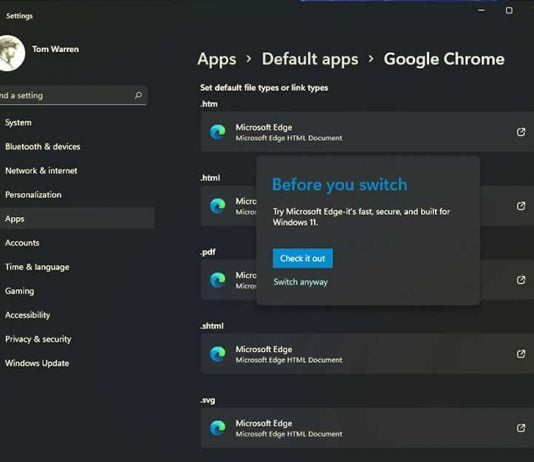Microsoft is known for its extremely aggressive methods of promoting the Edge browser in Windows 10. Now in with the upcoming Windows 11, the company is going to unnecessarily complicate the ability to change the browser and other default applications.
Microsoft is making a lot of positive changes to the user interface of Windows 11, making it easier and more convenient, but in some areas, the new OS is only getting more complex.
As in Windows 10, when you install a new browser and open a web link for the first time, a prompt will appear on the screen — “Always use this app” — allowing you to select and set a default browser other than Edge. If you forgot to check “Always use this app“, the default settings will never be changed. And you just have to go to Settings> Applications> Default applications and choose there, which we want the default browser to be.
According to The Verge, Microsoft changed the way Windows 11 assigns default apps, which means you now need to set defaults by file or link type. Now, instead of a single switch, you have to set values for different types of files or links separately. In the case of Chrome, the browser will have to be manually selected for HTM, HTML, PDF, SHTML, SVG, WEBP, XHT, XHTML, FTP, HTTP and HTTPS. Any file that you haven’t changed by default will automatically open in any previously installed application. In most cases, this is the Microsoft Edge browser.
This is an unnecessarily lengthy process compared to Windows 10, which allows you to quickly and easily switch email, maps, music, photos, videos, and default web browser apps.
Developers from Google, Opera, Firefox and Vivaldi are unimpressed with Microsoft’s changes to Windows 11 default apps.
“We have been increasingly worried about the trend on Windows,” says Selena Deckelmann, senior vice president of Firefox.
“Microsoft has a history of doing this, and it seems they are getting progressively worse,” says a Vivaldi spokesperson in a statement to The Verge.
“It’s very unfortunate when a platform vendor is obscurifying a common use case to improve the standing of their own product,” says Krystian Kolondra, Opera’s head of browsers.
Hiroshi Lockheimer, head of Android, Chrome and Chrome OS, on Twitter criticized the changes and expressed hope that the final version of Windows 11 will have a different mechanism, as it contradicts Microsoft’s claims to be the most open, with ‘the most choice.’
Choosing default apps isn’t the only problem third-party browser developers face in Windows 11. Microsoft ignored the default browser choice when searching in Windows 10, and its new taskbar widget forced users to use Edge regardless of the user’s choice. Windows 11 continues this trend, with search still forcing users to switch to Edge, and there is now a new dedicated widget area that also ignores browser default settings.
“It appears that Windows 11 widgets will ignore a user’s default browser choice and open Microsoft Edge for the content instead,” says a Brave spokesperson.
Microsoft justifies these changes by giving Windows users more control over their default applications.
“With Windows 11, we are implementing customer feedback to customize and control defaults at a more granular level, eliminating app categories and elevating all apps to the forefront of the defaults experience” says a Microsoft spokesperson to The Verge. “As evidenced by this change, we’re constantly listening and learning, and welcome customer feedback that helps shape Windows. Windows 11 will continue to evolve over time; if we learn from user experience that there are ways to make improvements, we will do so.“
The developers of other browsers hope that all these changes will not survive until the final build of the system, which should be released in early 2022.
